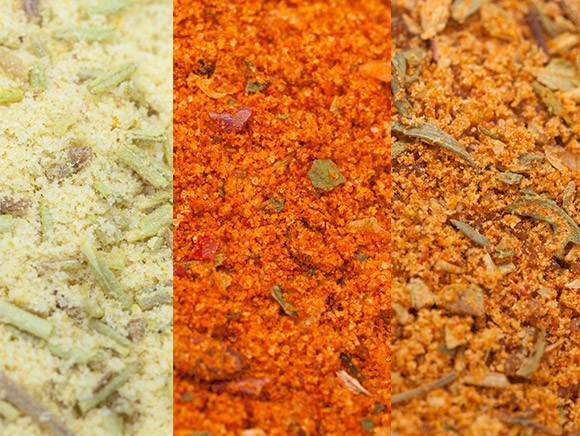
With tasty allergen-free herbs, spices and, since recently, sauces and marinades too, Dutch Spices is a valuable chain partner for the food industry. A process built around strict agreements is designed to ensure a transparent chain.
“Clear agreements with suppliers form the basis for allergen-free production,” says marketing advisor Betty Groen from Dutch Spices. “It’s essential. With herbs and spices as our building blocks, we succeed in carefully creating safe, allergen-free flavourings. It takes time, but we don’t try to rush things, particularly because of our quality-focused approach to creating new flavours. Allergen-free products form the basis for a transparent chain.” Suppliers to Dutch Spices, which is part of the Bieze Food Group, must complete a very extensive questionnaire plus they receive the threshold values for compliance with VITAL 2.0 (Voluntary Incidental Trace Allergen Labelling), the internationally accepted threshold-value system for allergen management. “That standard is the starting point for our allergen management system,” explains Betty Groen.
The special production unit in Nijkerk is designed to exclude the risk of cross-contamination and to guarantee the supply of allergen-free, food-safe products.
Among other things, the facility operates with tightly restricted access, hygiene regulations based on risk analysis, high-care allergen-free production areas, hygienic locks and special clothing and materials for each department. Internal and external workers are educated in allergen-free manufacturing and receive extra training through the Dutch Spices Academy, the platform which collates and shares allergen-related knowledge with all stakeholders, internally and externally. The company continually analyses and tests for any allergens that may be present either in the manufacturing process or the products. The herbs, spices and blends it produces are stored and shipped separately. Dutch Spices recently opened a ‘wet’ factory for marinades and sauces at its existing location. “Here, we produce components for manufacturers of retail and food-service products containing meat, potatoes, vegetables or cheese.”
The measures taken by Dutch Spices ensure allergen-free processes right up to dispatch. “The food manufacturers who subsequently work with our herbs and spices are not introducing new allergens into their production processes and products. Manufacturers still have to declare their ingredients, but because Dutch Spices’ products do not contain any declarable ingredients they do not have to declare any new allergens. This assures them that there will be no cross-contamination in the factory. Even our new peanut-free satay sauce does not require an allergen declaration,” explains Groen. “However, there are so many known allergens worldwide that there’s no such thing as 100% allergen-free. At Dutch Spices, the VITAL 2.0 standard is the basis for our allergen management system.”
Dutch Spices’ end products are free from 24 allergens in compliance with the VITAL 2.0 standard, which offers consumers a safe product by covering 95% to 98% of known allergens.
VITAL 2.0 uses threshold values to help food manufacturers decide whether they should warn of allergens, which may or may not originate from cross-contamination.
It concerns the 14 allergens listed in the EU Labelling Directive and the 10 additional allergens according to the ‘LeDa list’ compiled by the Dutch government in association with the Netherlands Nutrition Centre. The 24 allergens are: cereals containing gluten, crustaceans, egg, fish, peanuts, soybeans, milk, nuts, celery, mustard, sesame seeds, sulphite, lupin, molluscs, lactose, cocoa, glutamate, coriander, maize, legumes, beef, pork, chicken and carrots. Under current EU legislation, the 14 allergens must be declared for pre-packed products. Groen: “When the new labelling law comes into effect on 13 December this year, manufacturers will have to clearly state allergens on the label. Furthermore, the allergen information will need to be made available for non-packaged products too. That will have consequences for small and medium-sized fresh-food businesses in particular, since they will be legally obliged to provide information to their customers.”
Allergens are a major cause of product recalls in the food industry, often due to incorrect labelling during manufacturing, or an incorrect or omitted declaration on the product label. Another significant risk is cross-contamination during the production process. “So far there are no laws in place regarding cross-contamination. The policy is aimed at risk aversion: taking preventative steps to increase safety and eliminate risk. This policy applies to allergens too: implement measures first in the product, then in the process. This is a challenge, both for Dutch Spices and for the food industry in general, because how can consumers know whether a manufacturer has failed to inform them of cross-contamination? In that case, VITAL 2.0 can serve as an anchor,” says Groen. However, she cautions that working with Dutch Spices’ products does not give manufacturers carte blanche to automatically claim that their products are allergen-free. “Put adequate measures in place in your own process, know what you are sourcing and do not work with product specifications that are more than a year old,” she advises.
Dutch Spices and Allergenen Consultancy are currently developing SimplyOK, a certification scheme that places demands on allergen management and works with a risk-analysis methodology which is based on the VITAL 2.0 system. “SimplyOK comprises two parts: a certification scheme and a quality mark. The scheme is an additional audit of the allergen process, alongside the existing BRC and IFS audits. Companies who gain approval are allowed to include the SimplyOK quality mark on their packaging. Within the mark, a different icon has been designed for each of the 14 legally defined allergens so that consumers can immediately see whether a product is safe for them. Furthermore, this enables manufacturers to offer consumers transparency and uniformity – and that is what consumers, and especially those with allergies, want,” says Betty Groen.
‘So far there are no laws in place regarding cross-contamination’
In collaboration with the rest of the chain, Dutch Spices aims to provide safe, tasty and affordable products for consumers. Last September, the company took a step closer to consumers by launching its own brand, called Simply Spices, of herbs, spices and blends without allergens and E-numbers. Groen: “Because both Dutch Spices and Simply Spices do not use ingredients of animal origin, our products are also suitable for vegans. That opens up opportunities for manufacturers of vegetarian, kosher and halal products.”

Over 2 million Dutch people have experience of an allergy, either directly or indirectly (via family members). An increasing number of consumers are sensitive or intolerant to certain types of food; food intolerance is affecting ever-more children and is more frequently resulting in hospital admittance. The growing need for allergen-free food poses a challenge for the food industry, out-of-home sector and retailers. Consumers with a food allergy are faced with incomplete and inaccurate product labelling and are uncertain about which foods are safe for them. Meanwhile, as consumer awareness increases, people are keen to buy products without E-numbers for health or performance-related reasons.
Source: Dutch Spices